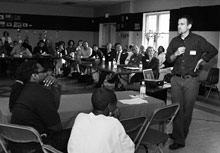Sometimes, the solution to a problem is … another problem.
Last year, 32 low-income residents of Richmond, Calif., participated in Solar Richmond, a training program for installing solar panels. Within weeks of completing the program, all of them interviewed with potential employers. In New York, an organization called Sustainable South Bronx has helped low-income workers transition from welfare to living-wage jobs in the environmental sector. Green For All, a national organization, was launched last September with the goal of connecting low-income youth with so-called “green-collar jobs” in Oakland, Detroit, Baltimore and New Orleans. And when presidential candidate Hillary Clinton visited Asheville, she promised to focus on creating “clean, renewable-energy jobs” if elected president.

Dan LeRoy believes Asheville is ripe for a similar endeavor. LeRoy, who works for the locally based Clean Air Community Trust, has been tracking these national efforts with great interest. At a May 1 forum held in the community center at the Pisgah View Apartments, a West Asheville public-housing complex, he laid out his vision for a local “green-collar” job-training program that would target low-income youth. Meanwhile, seed grants from Progress Energy’s Community Energy Advisory Council will place some public-housing residents in a short-term green-job training program within the next few months.
Disconnected youth
Community partnership was a central theme of the May 1 forum, and there appeared to be widespread interest in the embryonic program. Among the 40 or more people in attendance were representatives from the Asheville Housing Authority, the Asheville City Schools, Appalachian Energy, Progress Energy, the Western North Carolina Green Building Council, Clean Water for North Carolina, as well as local high-school and college students. Local artist/activist DeWayne Barton, who’s partnering with LeRoy to develop the program, kicked things off with a passionate spoken-word performance, accompanied by high-school student Dre Payton on African drum.
Asheville Housing Authority staffer Cathy Holt announced that her agency has received a $4,550 seed grant from Progress Energy’s Community Energy Advisory Council to train five public-housing residents in solar-panel installation. In addition, she noted, “We have been in conversations with Appalachian Energy about doing a solar-hot-water retrofit” on one of the city’s public-housing complexes, though she cautioned, “It’s not by any means a done deal.” Another CEAC grant, this one for $7,000, will help the Clean Air Community Trust conduct a pilot program connecting a few low-income residents with training in retrofitting homes for energy-efficiency.
After that, LeRoy pitched his long-term plan: creating an asheville youth climate corps. The program would provide job training, internships and other forms of support to prepare low-income youth ages 17 through 20 for employment in the environmental sector. In Asheville, 32 percent of African-Americans reportedly live below the poverty line, said LeRoy, citing 2000 U.S. Census data. He also noted a growing number of what he termed “disconnected youth” who are neither working nor in school.
Meanwhile, there’s a growing interest in “green-collar jobs”—environmentally friendly gigs that don’t require extensive training and offer good opportunities for advancement. An entry-level solar technician, for example, could earn $12 an hour to start, noted David Wallace of Appalachian Energy, who attended the forum. And if that person later became a crew leader, their hourly wage would jump to almost $20, he said.
As LeRoy envisions it, the program would provide local green businesses with youth interns and tap into national resources for funding. It would be guided by the philosophy of Green For All founder Van Jones, who’s drumming up national enthusiasm for the idea of tackling poverty and environmental issues in one go under the catch phrase “Pathways Out of Poverty.”
The forum also featured a youth panel, with local high-school and Warren Wilson College students presenting their findings on research they’d done to determine the level of community interest in such a program.
A question of survival
Amid a generally enthusiastic reception, a few questions were raised. A local high-school teacher cautioned the organizers, saying disenfranchised youth can be tough to reach. “They’re not thinking about the environment—they’re thinking about survival,” she said. “They may not come in with the attitude you might expect.”
And another Housing Authority staffer wondered, “What about the adults who don’t have jobs right now?”
Pisgah View resident Robert White, who founded the Pisgah View Community Peace Garden, had yet another concern. “What is going to be done to reach … the kids who are involved in criminal activity and selling drugs?” he wanted to know. He also emphasized the need for self-sufficiency in communities struggling with poverty, saying, “It has to happen on our terms.”
In response, LeRoy said he hoped that everyone at the table would help shape the initiative’s future. “It’s going to take all of us being involved,” he said, “to come up with solutions to these kind of problems.”



Before you comment
The comments section is here to provide a platform for civil dialogue on the issues we face together as a local community. Xpress is committed to offering this platform for all voices, but when the tone of the discussion gets nasty or strays off topic, we believe many people choose not to participate. Xpress editors are determined to moderate comments to ensure a constructive interchange is maintained. All comments judged not to be in keeping with the spirit of civil discourse will be removed and repeat violators will be banned. See here for our terms of service. Thank you for being part of this effort to promote respectful discussion.